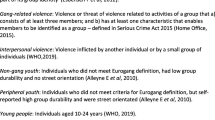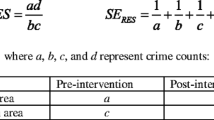Abstract
Studies examining citizenship, ethnicity, and victimization risk have offered mixed findings. Despite this, works have largely focused upon direct-contact victimization, and do not offer insights into how this risk may vary across these dimensions for other crimes not characterized by direct contact, such as identity theft. This lack of understanding undermines abilities to tailor policies to effectively support vulnerable persons, and may potentially elevate risk of this costly crime among marginalized groups. Given this, the study aims to examine the associations between citizenship status, ethnicity and identity theft risk. Using a sample from the 2018 National Crime Victimization Survey’s Identity Theft Supplement (n = 71,984), logistic regression analyses examined the odds of identity theft. Lacking citizenship was associated with decreased odds of identity theft victimization, as was Hispanic ethnicity. However, Hispanic noncitizens faced higher relative risk than either noncitizens or Hispanic persons individually. Noncitizens’ decreased relative risk may stem from avoidance behaviors which reduce their suitability or exposure through a lifestyle-routine activities perspective. Hispanic noncitizens’ increased risk relative to others may stem from their doubly marginalized status. Future work is needed considering avoidance behaviors and citizenship status, to more clearly understand how these factors influence relative risk of victimization.

Similar content being viewed by others
Notes
Importantly, the NCVS questionnaire may be administered in Spanish if requested by the respondent. Any supplemental surveys, such as the NCVS-ITS are similarly administered in the language requested by the subject (Bureau of Justice Statistics, n.d.).
Items were not disaggregated within the present analysis given limited victimization experience across individual forms of identity theft. For instance, only 0.78% of the analytic sample experienced new accounts-based identity theft victimization (n = 560).
Unfortunately, the NCVS-ITS did not delineate between other ethnic identities, thus precluding a more nuanced analysis of relative risk across the intersection of citizenship status and other ethnicities. Given this, generalization of findings is limited to a US context and to those identifying as either Hispanic or not Hispanic.
Given the nature and scope of the NCVS-ITS, several other potentially relevant factors relating to victimization risk, such as lifestyles and routine activities and self-control could not be included within the assessment. Despite this, risk and protective factors considered herein are consistent with prior works examining identity theft (Burnes et al., 2020; Reyns, 2013; Reyns & Henson, 2016), and reflect factors which may insulate or expose one to risk of identity theft.
In total, 15 persons identifying as transgender and 37 persons identifying as “none of these” were removed from the sample in this way.
References
Akdemir, N., & Lawless, C. J. (2020). Exploring the human factor in cyber-enabled and cyber-dependent crime victimisation: A lifestyle routine activities approach. Internet Research, 30(6), 1665–1687. https://doi.org/10.1108/INTR-10-2019-0400.
Anderson, K. B. (2006). Who are the victims of identity theft? The effect of demographics. Journal of Public Policy & Marketing, 25(2), 160–171. https://doi.org/10.1509/jppm.25.2.160.
Barranco, R. E., & Shihadeh, E. S. (2015). Walking ATMs and the immigration spillover effect: The link between latino immigration and robbery victimization. Social Science Research, 52, 440–450. https://doi.org/10.1016/j.ssresearch.2015.03.003.
Behrens, R., Freedman, M., & McGuckin, N. (2009). The challenges of surveying ‘hard to reach’ groups: Synthesis of a workshop. Transport survey methods: Keeping up with a changing world. Emerald Group Publishing Limited.
Biafora, F., & Warheit, G. (2007). Self-reported violent victimization among young adults in Miami, Florida: Immigration, race/ethnic and gender contrasts. International Review of Victimology, 14(1), 29–55. https://doi.org/10.1177/026975800701400103.
Black, D. (1976). The behavior of law. Academic.
Bucher, J., Manasse, M., & Tarasawa, B. (2010). Undocumented victims: An examination of crimes against undocumented male migrant workers. Southwest Journal of Criminal Justice, 7(2), 159–179.
Burchfield, K. B., & Silver, E. (2013). Collective efficacy and crime in Los Angeles neighborhoods: Implications for the latino paradox. Sociological Inquiry, 83(1), 154–176. https://doi.org/10.1111/j.1475-682X.2012.00429.x.
Bureau of Justice Statistics. (n.d.) National Crime Victimization Survey (NCVS). https://bjs.ojp.gov/data-collection/ncvs#6-0.
Burnes, D., DeLiema, M., & Langton, L. (2020). Risk and protective factors of identity theft victimization in the United States. Preventive Medicine Reports, 17, 101058. https://doi.org/10.1016/j.pmedr.2020.101058.
Caraballo, K., & Topalli, V. (2021). Walking ATMs: Street criminals’ perception and targeting of undocumented immigrants. Justice Quarterly, 1–31. https://doi.org/10.1080/07418825.2021.2005819.
Carafano, J. J. (2022, September 12). Immigration policy will remain the great divide in American politics. GIS Reports. Retrieved October 12, 2022, from https://www.gisreportsonline.com/r/united-states-immigration-policy/.
Cohen, L. E., & Felson, M. (1979). Social change and crime rate trends: A routine activity approach. American Sociological Review, 44, 588–608.
Copes, H., Kerley, K. R., Huff, R., & Kane, J. (2010). Differentiating identity theft: An exploratory study of victims using a national victimization survey. Journal of Criminal Justice, 38(5), 1045–1052. https://doi.org/10.1016/j.jcrimjus.2010.07.007.
Fields, O. (2023, December 1). Berglund Management Group notifies over 50K people of data breach WXFR. https://www.wfxrtv.com/science-technology/berglund-management-group-notifies-over-50k-people-of-data-breach/.
Flores, A. R., Wilson, B. D., Langton, L. L., & Meyer, I. H. (2023). Violent victimization at the intersections of sexual orientation, gender identity, and race: National Crime victimization Survey, 2017–2019. Plos One, 18(2). https://doi.org/10.1371/journal.pone.0281641.
Fussell, E. (2011). The deportation threat dynamic and victimization of latino migrants: Wage theft and robbery. The Sociological Quarterly, 52(4), 593–615. https://doi.org/10.1111/j.1533-8525.2011.01221.x.
Gallo, L., Maiello, A., Botta, A., & Ventre, G. (2021). 2 years in the anti-phishing group of a large company. Computers & Security, 105. https://doi.org/10.1016/j.cose.2021.102259.
Gottfredson, M. R. (1981). On the etiology of criminal victimization. Journal of Criminal Law and Criminology, 72(2), 714–726. https://doi.org/10.2307/1143011.
Graham, A., Cullen, F. T., Pickett, J. T., & Jonson, C. L. (2021). A new generation of survey research in criminology: Online opt-in surveys. The Criminologist, 46(6), 5–9.
Guedes, I., Martins, M., & Cardoso, C. S. (2023). Exploring the determinants of victimization and fear of online identity theft: An empirical study. Security Journal, 36(3), 472–497. https://doi.org/10.1057/s41284-022-00350-5.
Hanish, L. D., & Guerra, N. G. (2000). The roles of ethnicity and school context in predicting children’s victimization by peers. American Journal of Community Psychology, 28(2), 201–223. https://doi.org/10.1023/A:1005187201519.
Harrell, E. (2021). Victims of identity theft, 2018: Summary. Bureau of Justice Statistics.
Henson, B., Reyns, B. W., & Fisher, B. S. (2013). Fear of crime online? Examining the effect of risk, previous victimization, and exposure on fear of online interpersonal victimization. Journal of Contemporary Criminal Justice, 29(4), 475–497. https://doi.org/10.1177/1043986213507403.
Hollis-Peel, M. E., Reynald, D. M., Van Bavel, M., Elffers, H., & Welsh, B. C. (2011). Guardianship for crime prevention: A critical review of the literature. Crime Law and Social Change, 56, 53–70. https://doi.org/10.1007/s10611-011-9309-2.
Hu, X., Lee, J. S., & Lovrich, N. P. (2023). Do commonly recommended preventive actions deter identity theft victimization? Findings from NCVS identity theft surveys. Journal of Crime and Justice, 46(2), 172–193. https://doi.org/10.1080/0735648X.2022.2103015.
Internet Crime Complaint Center (n.d.). Internet crime report, 2022. https://www.ic3.gov/Media/PDF/AnnualReport/2022_IC3Report.pdf.
Irvin-Erickson, Y. (2023). How does immigration status and citizenship affect identity theft victimization risk in the US? Insights from the 2018 National Crime victimization survey identity theft supplement. Victims & Offenders. https://doi.org/10.1080/15564886.2023.2231954.
Irvin-Erickson, Y. (2024). Consequences of identity theft victimization: Disabilities and mental distress. Crime & Delinquency. https://doi.org/00111287241227926. advance online publication.
Jiménez, J., Noticias Telemundo, & Ojeda, R. (2021, December 15). Scam messages are targeting Latino immigrants. Here’s how to avoid them NBC News. https://www.nbcnews.com/news/latino/scam-messages-are-targeting-latino-immigrants-avoid-rcna8861.
Krown, K. (2022, July 14). Scammers impersonate US immigration officers Federal Trade Commission. https://consumer.ftc.gov/consumer-alerts/2022/07/scammers-impersonate-us-immigration-officers.
Li, Y., Yazdanmehr, A., Wang, J., & Rao, H. R. (2019). Responding to identity theft: A victimization perspective. Decision Support Systems, 121, 13–24. https://doi.org/10.1016/j.dss.2019.04.002.
Maher, C. A. (2023). Buyer beware, or buyer unaware? Examining the correlates of consumer fraud victimization acknowledgment in the United States. Crime & Delinquency, advance online publication. https://doi.org/00111287231197422.
Maher, C. A., & Hayes, B. E. (2024). Nonfinancial consequences of identity theft revisited: Examining the association of out-of-pocket losses with physical or emotional distress and behavioral health. Criminal Justice and Behavior, 00938548231223166.
Miller, A. M. (2022, July 7). Crimes committed by illegal immigrants surged in 2021 after declining in previous years. Fox News. Retrieved from https://www.foxnews.com/us/crimes-committed-illegal-immigrants-surged-2021-declining-previous-years.
National Crime Victimization Survey: Identity Theft Supplement, [United States], (2018). Identification No 37923.
Paek, S. Y., & Nalla, M. K. (2015). The relationship between receiving phishing attempt and identity theft victimization in South Korea. International Journal of Law Crime and Justice, 43(4), 626–642. https://doi.org/10.1016/j.ijlcj.2015.02.003.
Patler, C., & Gonzalez, G. (2021). Compounded vulnerability: The consequences of immigration detention for institutional attachment and system avoidance in mixed-immigration-status families. Social Problems, 68(4), 886–902. https://doi.org/10.1093/socpro/spaa069.
Pridemore, W. A., Makel, M. C., & Plucker, J. A. (2018). Replication in criminology and the social sciences. Annual Review of Criminology, 1, 19–38. https://doi.org/10.1146/annurev-criminol-032317-091849.
Randa, R., & Reyns, B. W. (2020). The physical and emotional toll of identity theft victimization: A situational and demographic analysis of the National Crime Victimization Survey. Deviant Behavior, 41(10), 1290–1304. https://doi.org/10.1080/01639625.2019.1612980.
Reynolds, D. (2022). Everyone is victimized or only the naïve? The conflicting discourses surrounding identity theft victimization. International Review of Victimology, 02697580221091284. https://doi.org/10.1177/02697580221091284.
Reyns, B. W. (2013). Online routines and identity theft victimization: Further expanding routine activity theory beyond direct-contact offenses. Journal of Research in Crime and Delinquency, 50(2), 216–238. https://doi.org/10.1177/0022427811425539.
Reyns, B. W., & Henson, B. (2016). The thief with a thousand faces and the victim with none: Identifying determinants for online identity theft victimization with routine activity theory. International Journal of Offender Therapy and Comparative Criminology, 60(10), 1119–1139. https://doi.org/10.1177/0306624X15572861.
Reyns, B. W., Fisher, B. S., Bossler, A. M., & Holt, T. J. (2019). Opportunity and self-control: Do they predict multiple forms of online victimization? American Journal of Criminal Justice, 44(1), 63–82. https://doi.org/10.1007/s12103-018-9447-5.
Snow, A. (2023, February 23). Prosecutor: Arizona border rancher shot at unarmed migrants. AP NEWS. Retrieved from https://apnews.com/article/crime-arizona-law-enforcement-0068c0af339606f3e3f1e1a0182bfe04.
Stack, B. (2018). Here’s how much your personal information is selling for on the dark web. Experian. Haettu, 4, 2021.
Steel, C. M. (2019). Stolen identity valuation and market evolution on the dark web. International Journal of Cyber Criminology, 13(1), 70–83. https://doi.org/10.5281/zenodo.3539500.
Von Hentig, H. (1948). The criminal & his victim; studies in the sociobiology of crime. Yale University Press.
Wright, K. A., Turanovic, J. J., & Rodriguez, N. (2016). Racial inequality, ethnic inequality, and the system involvement of at-risk youth: Implications for the racial invariance and latino paradox theses. Justice Quarterly, 33(5), 863–889. https://doi.org/10.1080/07418825.2014.987310.
Wu, Y., & Altheimer, I. (2013). Race/ethnicity, foreign-born status, and victimization in Seattle, WA. Race and Justice, 3(4), 339–357. https://doi.org/10.1177/2153368713508191.
Xie, M., & Baumer, E. P. (2021). Immigrant status, citizenship, and victimization risk in the United States: New findings from the National Crime Victimization Survey (NCVS). Criminology, 59(4), 610–644. https://doi.org/10.1111/1745-9125.12278.
Zadnik, E., Sabina, C., & Cuevas, C. A. (2016). Violence against latinas: The effects of undocumented status on rates of victimization and help-seeking. Journal of Interpersonal Violence, 31(6), 1141–1153. https://doi.org/10.1177/0886260514564062.
Funding
The author received no financial support for the research, authorship, and/or publication of this manuscript, and indicates no competing interests relating to the manuscript.
Author information
Authors and Affiliations
Corresponding author
Ethics declarations
Competing interests
The author declares no competing interests.
Additional information
Publisher’s Note
Springer Nature remains neutral with regard to jurisdictional claims in published maps and institutional affiliations.
Rights and permissions
Springer Nature or its licensor (e.g. a society or other partner) holds exclusive rights to this article under a publishing agreement with the author(s) or other rightsholder(s); author self-archiving of the accepted manuscript version of this article is solely governed by the terms of such publishing agreement and applicable law.
About this article
Cite this article
Maher, C.A. Examining the Association Between Citizenship and Ethnicity on Identity Theft Risk: Findings from the National Crime Victimization Survey. Am J Crim Just (2024). https://doi.org/10.1007/s12103-024-09759-7
Accepted:
Published:
DOI: https://doi.org/10.1007/s12103-024-09759-7




